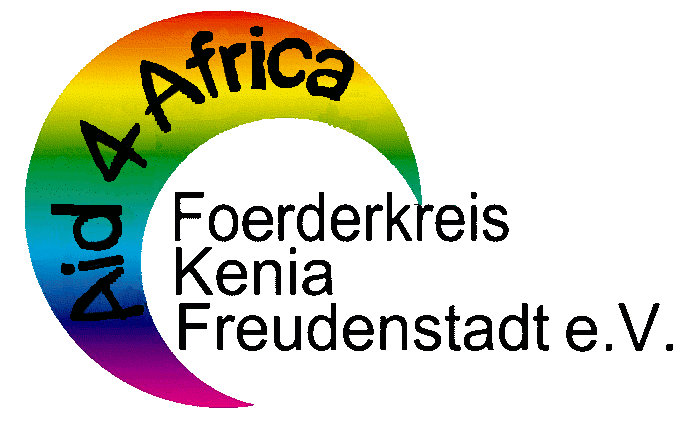
|

Report on our 2012 Project Journey to Kenya — Visits to the Tana River Region
Office of Foerderkreis Kenia Freudenstadt e.V., Germany. Updated version. Original English version first published May 31, 2012. Page 2/4.
Sunday, March 4, 2012: Malindi
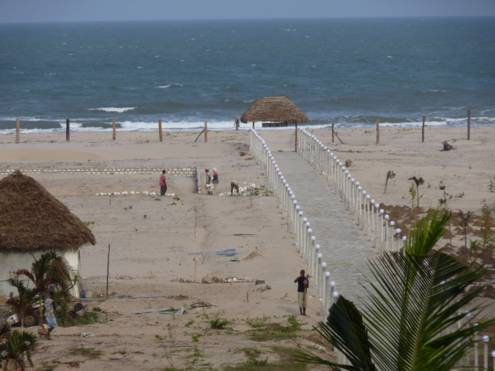
View of the Indian Ocean coast from our hotel in Malindi.
|
After breakfast, we took a local taxi ride to the Lutheran parish in Malindi where we attended a Women's World-Day-of-Prayer service. In the church building, our society's project coordinator met the local pastor for discussing the work of our society. Another representative of our society paid a visit to the Women's World-Day-of-Prayer service, which was opened by a lady's choir and a band both of which were accompanied by the whole congregation. This was a very lively kind of service indeed that followed a predefined program with many women participating in the liturgy, something rarely found in Europe. Our member was personally greeted in the service and could thus take the opportunity to introduce herself and our society to the congregation. The large number of children was attending a children's service in another room. Altogether, the service lasted for four hours including the collection of tithes and the donation of the previous week (all part of their Women's World-Day-of-Prayer donations). After the pastor's final blessing, the congregation left the church forming a circle outside the building where everyone greeted each other and prayed before leaving — a rare gesture if compared to the behavior common in many Central European churches. The following day, our members paid a farewell visit to the pastor's building handing over to him some children's clothing. In January 2012, the pastor's wife, already the mother of a three year old girl, had unfortunately died after having given birth to twins. Within the limited means available to them, the pastor's sister and mother are now caring for all three children.
|

Monday, March 5 – Friday, March 9, 2012: Acclimatization in Malindi
At least for Northern and Central European visitors like us, the intense tropical climate of the East African coast was found to be best bearable by introducing a period of acclimatization. One of our society members, celebrating her birthday, was surprised when finding herself being confronted with a musical intermezzo of the hotel's complete staff — a most remarkable gesture that was topped by a plethora of flowers at the breakfast table and in her room to which should be added a beautiful bunch of flowers from the chief waiter of the hotel.
|
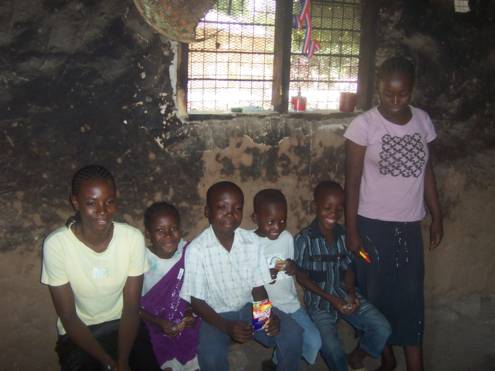
Children of supported family in their house in the Tana River area (fatherless children). Hermann, the boy on the bench's right, received a medical operation in 2009 financed by our society.
|
|
Saturday, March 10: Journey to the Tana River
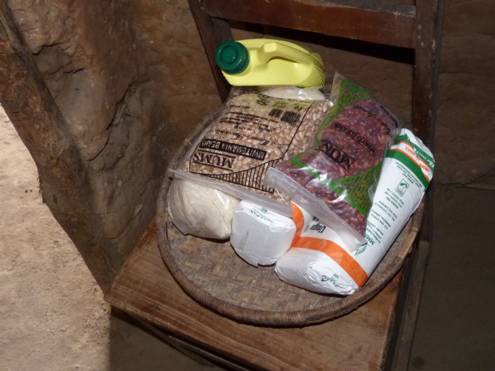
Staple food packet donated to the family by our society.
|
Before breakfast, we deposited part of our unneeded baggage at the hotel's reception and left with our Kenyan driver and his SUV for Idzowe, a village situated some 50 miles from Malindi. At around 09:30 a.m. we arrived there visiting a widow who has to care for her family of half a dozen children. For supporting this family in need we distributed some clothes and toys brought with us from Germany before handing out our society's financial donation for renovating their house. Due to the family's inadequate food-supply, we gave the widow a ration of staple food including four packets maize flour, three kg beans, three kg rice, and some cooking oil. Hermann, one of the family's children, has been receiving support from our society since 2009. After a medical operation financed by our society in 2009, his health condition is comparatively good. Due to tissue changes in connection to the operation, however, he will continue to receive regular medical examinations twice a year in Mombasa. Not being able to pay for the bus return ticket from her village to Mombasa, the several-day-long stay in Mombasa including accommodation and finally the medical examinations, his mother requested our society to continue paying her son's medical bills. The society is also supporting the oldest sister, one of the best in her school, by paying her tuition fees.
|
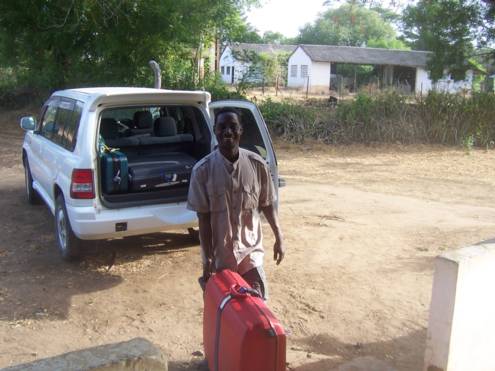
Our driver while unloading our baggage in Wema.
|
|
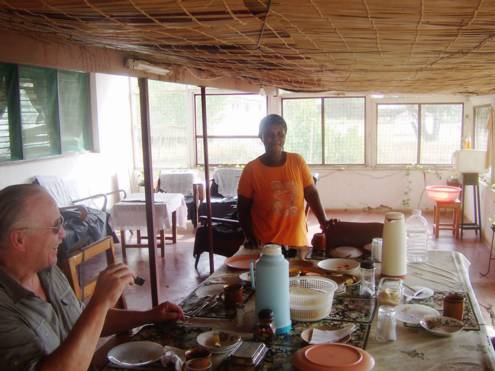
Talk with the housekeeper while having lunch in the Catholic Mission, Wema.
|
At 11:30 a.m. we continued driving the five-mile long distance to the Catholic missionary station in Wema which some of our members are in contact with since 1980. One of the pastors working there warmly welcomed us showing us around our rooms for the following night. Being completely unaccustomed to high outside temperatures of more than 104 degrees Fahrenheit, or 40 degrees Centigrade, the sun's unrelenting burning onto the missionary building's heat-absorbing sheet iron roof became a real challenge for us which made our staying in the rooms almost impossible during the day. Due to the building's pending renovation, the rooms, including all sanitary facilities, were in a state beyond our expectations. In addition to this we learned the missionary station's well water pump had ceased to be in working order for already more than two years, which basically meant that we had no tap water during this year's stay. Instead, all sanitary installations had to be flushed by emptying water buckets with the replacement of the previously well-working shower now consisting of a large ladle. We furthermore learned that the empty buckets in the washing rooms were refilled on a daily basis by an old man who had to carry heavy water canisters all the way from the neighborhood's dispensary to the station. During lunchtime and a delicious tropical meal we exchanged thoughts with both pastors and the station's Kenyan housekeeper and cook.
|
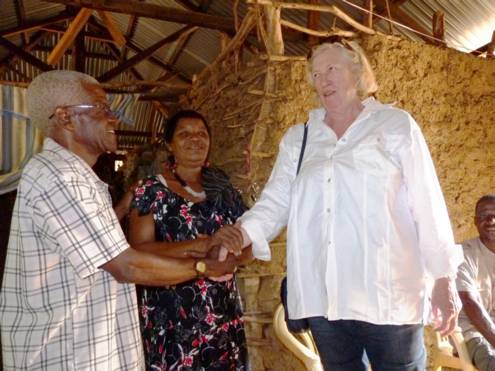
Meeting with a pastor and his wife who are cooperating with our society. On the right: society member.
|
|
Sunday, March 11, 2012: Kulesa
In the morning, we took a three mile ride to nearby Kulesa, a typical Pokomo village which we estimated to consist of some 200 buildings most of which were constructed in the mud-house style typical of rural Africa. The roofs are usually covered with grass or other plant material, which is nowadays being replaced with sheet iron in some buildings. The whole village not having any paved streets or thoroughfares, no public water supply and no mains supply strongly reminded us of reports on American or European ways of living predating the onset of industrialization. On the other hand, we observed that a few villagers have now begun to set up a more modern makeshift energy supply for their homes using solar panels. Despite first assuming that this apparently idyllic rural environment would be conducive to good health, our society members soon learned that even mild winds were causing large amounts of dust to be transported into the air thus easily affecting their respiratory system.
|
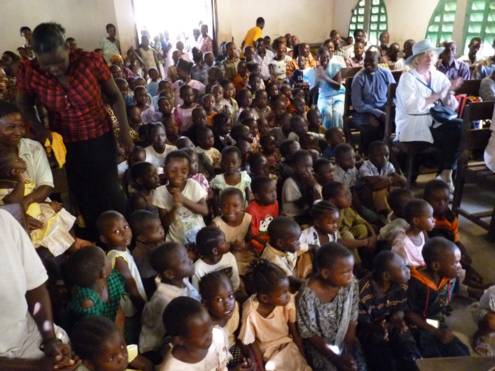
Service in Kulesa.
|
|
Hunger relief action for Kulesa:
While still staying in Malindi, we had received an unexpected but urgent telephone call from a Lutheran pastor, a friend of ours, who informed us on the drought and famine crisis in Kulesa. For starting a small immediate hunger relief operation, we thus bought some staple food packages that were later to be distributed to those in need. The lack of adequate raining for more than one-and-a-half years had brought about arid soils, unending drought and, in consequence, famine. Those individuals affected by the drought are spending a considerable amount of their time and energy into providing the food needed by their families. After having arrived, we first attended a very touching service in the small Lutheran protestant church in Kulesa, which was characterized by lots of music including dancing and singing. The Lutheran pastor, whom our society is cooperating with, introduced our group to the congregation whereupon our society's project coordinator reciprocated the salutation publicly during the service. After the service ended we distributed some small gifts to the approximately 100 children present before walking on to the pastor's house whom we handed over a notebook that was donated by our society. This was followed by our immediate hunger relief action, which consisted in the distribution of the staple food packages to widows and orphans. Each family supported by this action received a ration consisting of 2.5 kg rice, 2.5 kg maize flour, 2 kg beans, and one bottle of cooking oil. This was followed by our distributing of several articles of clothing to a small number of families that were selected for being especially in need. Altogether our hunger relief action reached a total of 35 recipients and their families.
|
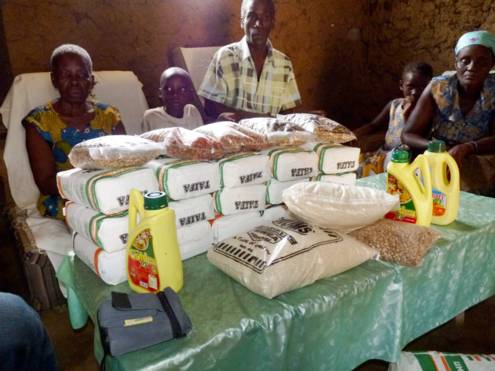
Distribution of staple food packets to families in need (immediate hunger relief action).
|
|
Wild Honeybee Project in Kulesa
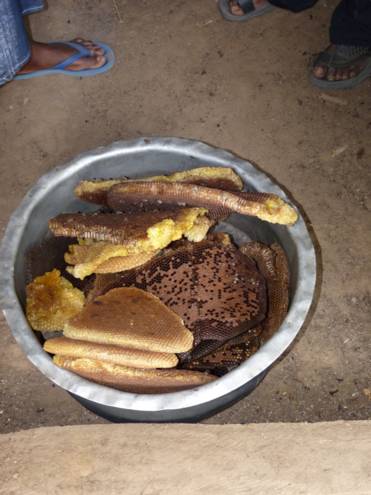
Small part of this year's honey.
|
During the afternoon hours, our society members and eleven local representatives of the honeybee project's executive committee met under the shadow of a large tree, discussing details pertaining to the continuation of the project. Having helped to kick-start this project, we are continuing the financial support of the project's initial phases in which all individuals operating the project are acting independently and closely following the guidelines of the Kenyan Ministry of Agriculture which is giving the needed introductory courses in beekeeping in Kulesa. In a later phase, the families operating the project, each of which got a yield of approximately 15 kg honey in the project's first year, are planning to be registered as a cooperative. After the meeting, we visited the bee house, built last year, and were shown several hives that had been fastened to trees, with three hives already being populated by wild honeybees. Currently, new bee swarms are being searched for which would then be collected and transferred to new and already suitably prepared hives. To our knowledge some fifty family members already registered for the honeybee project in Kulesa but were mostly not able yet to participate in the search for new bee swarms and the project's other duties as the continuing drought is forcing them to predominantly tend for their own livelihood. Additional topics discussed included the steps necessary for the continuation and securing of the project; and the reception of our Kenyan partners' official application for continued support of the honeybee project by Foerderkreis Kenia e.V. This will be one of the topics discussed by our society's members in this year's annual membership meeting. In the end, the society's project coordinator handed over to them the financial support for 2012 whereupon all those attending expressed their gratitude for the important and constructive help of our society.
|
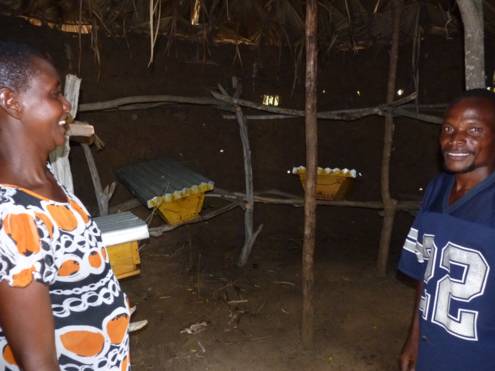
View of bee house.
|
|
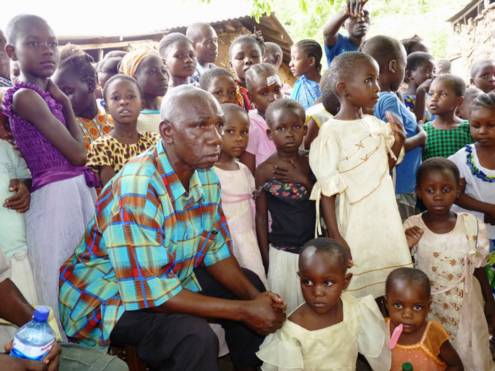
Village residents during our visit.
|
|
|
After this important and interesting meeting we left Kulesa in the early afternoon hours and were taxied by our driver for 55 miles on unpaved and surprisingly pothole-rich roads until reaching the Catholic sisters in Baharini.
|
|

|
